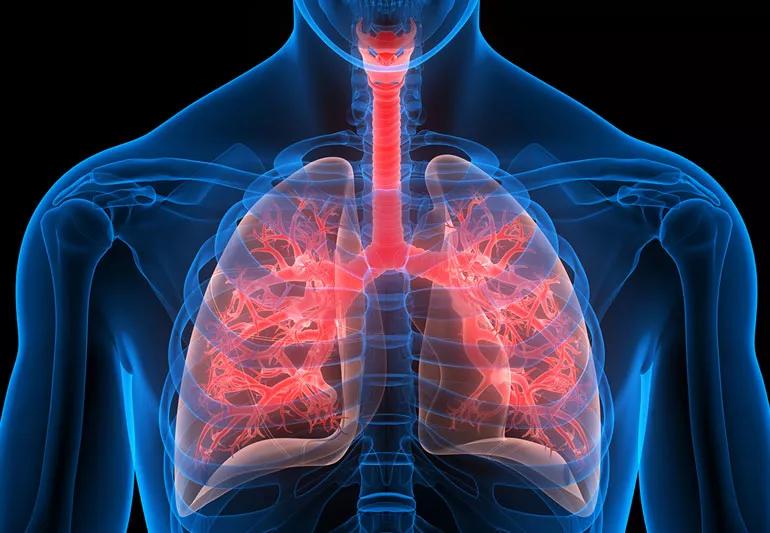The right treatment starts with the right diagnosis

Image content: This image is available to view online.
View image online (https://assets.clevelandclinic.org/transform/6042e4bf-bf39-4bd6-9d09-1d421394d136/cysticDiagnosis-1248216538-770x553-1_jpg)
illustration of lungs in the human body
If you suffer from ongoing shortness of breath or frequent lung infections, there are many possible culprits — including cysts in your lungs that could lead to cystic lung diseases.
Advertisement
Cleveland Clinic is a non-profit academic medical center. Advertising on our site helps support our mission. We do not endorse non-Cleveland Clinic products or services. Policy
The challenge for patients and doctors is to nail down a specific diagnosis. Getting the right treatment depends on it. However, doing so is complicated. There are more than half a dozen categories of cystic lung diseases and they have many potential causes and presentations.
“Some cystic lung diseases are the result of infection in the lung, an underlying lung disease or disease of the whole body that has manifestations in the lung,” says pulmonologist Peter Mazzone, MD, MPH.
Some cystic lung diseases relate to other problems in your body. For example, Birt-Hogg-Dubé syndrome leads to disease in the lung and tumors on the kidney. Smoking is another connection, too, much like other lung conditions. These include interstitial pneumonia and pulmonary langerhans cell histiocytosis.
Many other causes of cystic lung disease have no link to any particular behavior or cause. There might be a congenital or genetic reason why someone develops a specific condition, instead.
“The symptoms vary, too,” says Dr. Mazzone. “For example, a cystic lung disease known as lymphangioleiomyomatosis (LAM) can present with collapse of the lung. This occurs when a cyst erupts, leading to air leaking out of the lung.”
Advertisement
If you experience progressive shortness of breath, frequent lung infections or any other lung condition that can’t be explained otherwise, see your primary care provider. They may want to order a scan of your lungs.
“All this variety can make getting a diagnosis challenging,” says Dr. Mazzone. “Cystic lung diseases are also rare. That makes it unlikely that patients would be aware of them and bring them up with doctors.”
You can help reach the right diagnosis by watching for common symptoms like progressive shortness of breath, frequent lung infections or any other lung condition that can’t be explained otherwise. If you experience any of these symptoms, see your primary care doctor. They may want to order a scan of your lungs.
“If cysts show up on the scan, your doctor should refer you to a pulmonary specialist,” says Dr. Mazzone. “The pulmonologist will be equipped to detect and diagnose your specific condition so you can get the treatment you need.”
If you have recurring infections, your doctor may want to remove frequently infected cysts. Surgery might also be necessary for congenital lung disease if a section of your lung didn’t develop normally and is prone to infection and bleeding.
“For cystic lung diseases, there’s no one-size-fits-all approach,” says Dr. Mazzone. “Treatment may involve smoking cessation, medications or surgery, or a mix of these. It depends on your underlying condition.”
Specific treatments aren’t always available when the disease is genetic in nature. Still, knowing about the disease is useful to guide screening for other family members who may be at risk.
“Some patients progress to the point where they need a lung transplant,” he says. “Most cases don’t progress that far, though. Depending on the disease causing the cysts, some patients benefit from treatment with a immunosuppressant drug, which helps slow the development of cysts that are part of the disease.”
Advertisement

Delivered every Tuesday!
Sign up for our Health Essentials emails for expert guidance on nutrition, fitness, sleep, skin care and more
It's a letter about the news!

Every two weeks once
Sign up for our Health Essentials emails for expert guidance on nutrition, fitness, sleep, skin care and more.
Learn more about our editorial process.
Advertisement
Most recommended precautions center around minimizing bruising or swelling
Even one drink can have an impact on your cognitive function leading to slurred speech, blurred vision and impaired memory
Understand who may (and may not) benefit
Lorem ipsum dolor sit amet. Et odio Quis vel ipsam omnis eum alias deleniti et placeat impedit non voluptas galisum hic autem enim et cupiditate aliquid. Est beatae quidem non facilis autem ut commodi nisi aut tempore rerum et dolores voluptatem cum enim optio id sapiente quasi. Ad laboriosam officiis 33 cupiditate sequi ea voluptatum consectetur qui necessitatibus voluptate et quasi doloremque et facere explicabo quo explicabo officia
Seeking help through therapy can be an important step in improving your quality of life when you have UC
Type 2 diabetes isn’t inevitable with these dietary changes
Applying a hot or cold compress can help with pain
Pump up your iron intake with foods like tuna, tofu and turkey